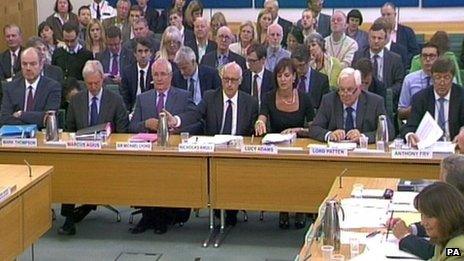Commentators on BBC pay-off hearing
- Published

The line-up in front of the committee included former BBC director general Mark Thompson (far left) and BBC Trust chairman Lord Patten (second from right)
Seven former and current BBC bosses spent an uncomfortable few hours in front of the Commons spending watchdog on Monday.
They were being grilled about their handling of large pay-offs to outgoing executives, particularly a package of almost £1m to Mark Byford, a former deputy director of the BBC.
Their evidence has been picked apart by commentators, with most agreeing on one thing - it was not a good day for the BBC.
However, many of them have given it five out of five for entertainment value.
Emily Bell, writing in the Guardian, compared to it one of the BBC's finest costume dramas, external.
There had been a bit of mud slinging between former director general Mark Thompson and BBC Trust chairman Lord Patten prior to the hearing about who knew what and when, and the actors struggled to hide their feelings - said Bell.
Margaret Hodge: Executive pay-offs were "on another planet"
"A line of metaphorically and literally red-faced executives sat shoulder to shoulder, barely controlling their animosity toward one another, during a systematic and riveting three-hour grilling by MPs led by Margaret Hodge," she wrote.
The Daily Mail's Quentin Letts , externalalso drew a dramatic comparison: "The longer it lasted, the more it resembled one of those vote-outs in a TV talent show, where you know one of the contestants must take the bullet."
Ann Treneman, sketchwriter for The Times, external, described it as "reality TV about unreal people".
The "BBC blame game" was a "ratings smash", according to the Daily Telegraph., external
"The mood was cross and resentful," said its sketchwriter Michael Deacon.
"It was like that bit in the Apprentice when the captain of the losing team and the two worst performing candidates are dragged into Lord Sugar's boardroom to find out who's to blame for their team's catastrophic failure, and the answer is always, 'Everyone but me'."
Meanwhile, Mrs Hodge, the Labour MP in charge of the Public Accounts Committee, is cast as the headmistress-like heroine of the boardroom.
Described as "magnificently feisty" by the Times, external, the Daily Telegraph said she was "having the time of her life", external.
"Lady Hodge, she of the electric-saw fingernails and tortoiseshell cruelty,, external had summoned them to work out who was telling lies," added Letts in the Daily Mail.
'Grasping elite'
But on a serious note, many of the editorials said the show raised questions about the future of the licence fee and the BBC Trust, which has the dual role of being the corporation's regulator and cheerleader.
The Sun, external described the evidence as "jaw-dropping" and focused on Mr Thompson's justification for giving Mr Byford more than he was contractually entitled to.
The reason offered was because the corporation had wanted Mr Byford to be "fully focused" on his job in the final months of his tenure.
"The whole cabal scratched each other's backs with cash, a hundred thousand here and a quarter of a million there. Stuffing their pockets with licence payers' hard-earned money," the paper said.
Lord Patten: "BBC has a culture of over-paying"
The idea of an "elite" and a "cosy culture" at the top of the corporation is shared by several other national newspapers.
"What matters here is not which memos were sent to whom, and who signed off which particular payment or policy," according to the Daily Telegraph's leader, external.
"The BBC hierarchy appeared to operate according to its own rules, with members of the privileged club rewarding each other with incomes commensurate with their egos rather than their talents."
Letts concluded that the main victim of the day was the BBC, "which far from being a bulwark of the truth, served as a funding faucet for its grasping elite".
Bell thought the main casualty of the "bruising encounter" was the governance of the BBC.
She said the danger now was that "the incompetence of the present governance regime will be mistaken for the unsuitability of the structure full stop".
"It would be a terrible shame if the default position on resetting the BBC's mission started with an organisational chart rather than with the people who occupy the positions," she said.
She said Mr Thompson, who is now chief executive of the New York Times, "came away relatively unscathed and certainly in too much of a fog of unresolved detail to dent his new career".
The paper's London bureau chief Steven Erlanger was given the unenviable task of covering the story but there was no editorial.
He said the "much-anticipated" hearing "created modest heat and rather less light", external.
- Published9 September 2013
- Published10 September 2013
- Published9 September 2013
- Published9 September 2013
- Published9 September 2013